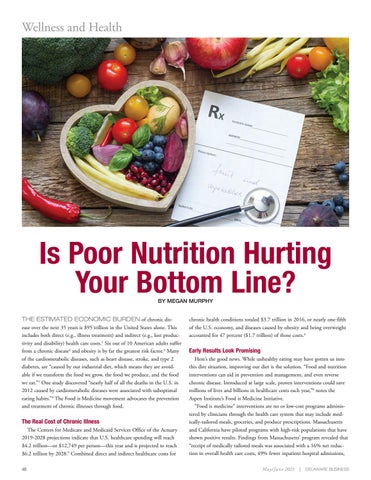Wellness and Health
Is Poor Nutrition Hurting Your Bottom Line? BY MEGAN MURPHY
THE ESTIMATED ECONOMIC BURDEN of chronic disease over the next 35 years is $95 trillion in the United States alone. This includes both direct (e.g., illness treatment) and indirect (e.g., lost productivity and disability) health care costs.1 Six out of 10 American adults suffer from a chronic disease2 and obesity is by far the greatest risk factor.3 Many of the cardiometabolic diseases, such as heart disease, stroke, and type 2 diabetes, are “caused by our industrial diet, which means they are avoidable if we transform the food we grow, the food we produce, and the food we eat.”1 One study discovered “nearly half of all the deaths in the U.S. in 2012 caused by cardiometabolic diseases were associated with suboptimal eating habits.”4 The Food is Medicine movement advocates the prevention and treatment of chronic illnesses through food.
The Real Cost of Chronic Illness The Centers for Medicare and Medicaid Services Office of the Actuary 2019-2028 projections indicate that U.S. healthcare spending will reach $4.2 trillion—or $12,749 per person—this year and is projected to reach $6.2 trillion by 2028.5 Combined direct and indirect healthcare costs for 46
chronic health conditions totaled $3.7 trillion in 2016, or nearly one-fifth of the U.S. economy, and diseases caused by obesity and being overweight accounted for 47 percent ($1.7 trillion) of those costs.3
Early Results Look Promising Here’s the good news. While unhealthy eating may have gotten us into this dire situation, improving our diet is the solution. “Food and nutrition interventions can aid in prevention and management, and even reverse chronic disease. Introduced at large scale, proven interventions could save millions of lives and billions in healthcare costs each year,”6 notes the Aspen Institute’s Food is Medicine Initiative. “Food is medicine” interventions are no or low-cost programs administered by clinicians through the health care system that may include medically-tailored meals, groceries, and produce prescriptions. Massachusetts and California have piloted programs with high-risk populations that have shown positive results. Findings from Massachusetts’ program revealed that “receipt of medically tailored meals was associated with a 16% net reduction in overall health care costs, 49% fewer inpatient hospital admissions, May / Jun e 2021 | DELAWARE BUSINESS
